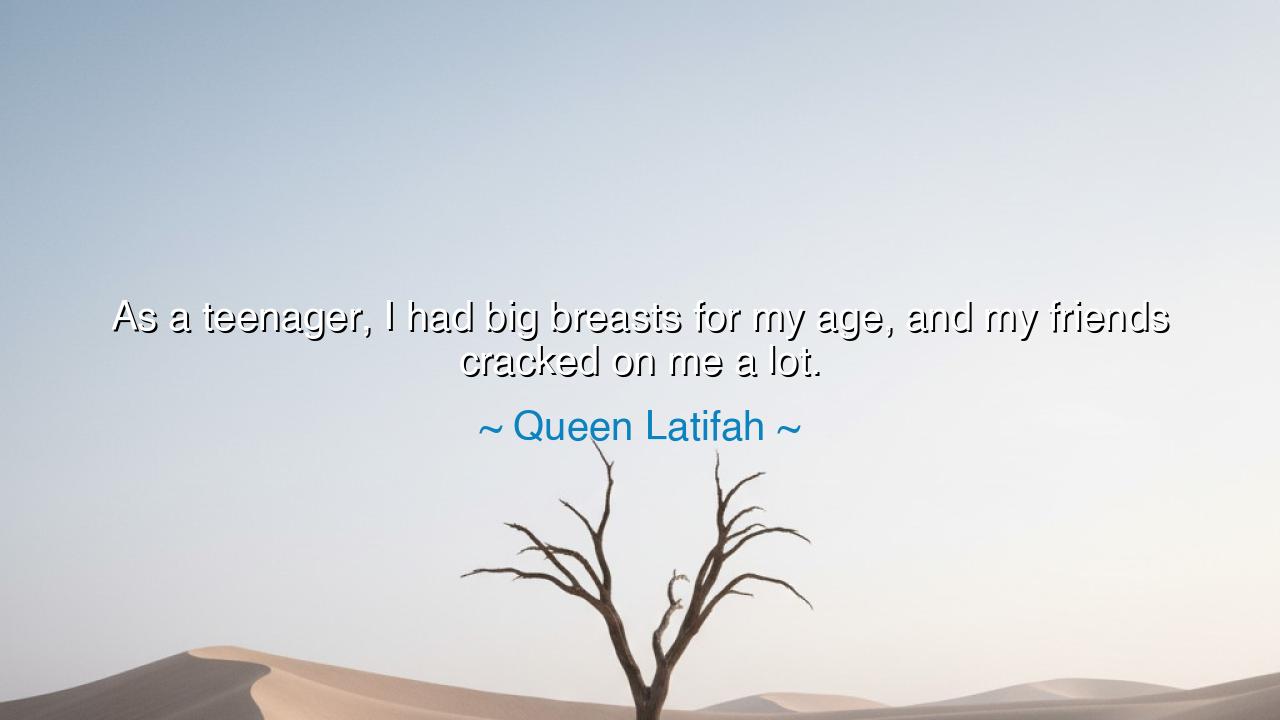
As a teenager, I had big breasts for my age, and my friends






“As a teenager, I had big breasts for my age, and my friends cracked on me a lot.” — Queen Latifah
Behold this humble yet profound confession from Queen Latifah, daughter of struggle and strength, a woman who rose from ridicule to reign with dignity. Though her words speak of the body, they echo a deeper wound—the pain of difference, the trial of becoming, and the slow forging of self-acceptance in the fire of mockery. For every generation must learn: the road to self-love begins not with beauty unchallenged, but with beauty misunderstood.
In her youth, Queen Latifah carried a body that announced her before her voice could speak. Her form, blossoming before its time, drew laughter and whisper, eyes that judged and tongues that mocked. Yet she endured. For the body, when marked by difference, becomes both burden and banner. What others saw as shame, she later transformed into strength, standing tall as a queen who made no apology for her presence. Thus, from the soil of ridicule, she grew the flower of confidence—a living testament that one may turn pain into power when the soul refuses to bow.
The ancients too knew this path. Remember the story of Sappho of Lesbos, that poet of burning heart, whose verses shamed the men who sought to silence her. She too was mocked—called unruly, too bold, too sensual. Yet her words have outlived her mockers. Like Latifah, she carried a form and a voice that defied the narrow frames of her age. And so, both women—one singing in ancient Greece, the other in the rhythms of hip-hop—stood as mirrors of the eternal truth: that what sets you apart is not your curse, but your crown.
The laughter of others is a cruel teacher. It wounds the spirit, yet reveals the soul. When the world ridicules what you cannot change, it invites you to either hide or rise. Queen Latifah chose to rise. Her body, once the target of jokes, became her throne. Her voice, once silenced by shame, thundered across generations, proclaiming that confidence is not the absence of judgment—it is the refusal to let judgment rule your life.
So, what lesson lies within these words? It is this: your body, your difference, your scars—all are the sacred script of your becoming. The world may not yet understand their meaning, but you must learn to read them with reverence. Let no laughter define your worth. Let no gaze dictate your grace. The temple of the self is built from acceptance, and every insult carved into its walls becomes a mark of resilience when answered with love.
If ever you find yourself mocked for what you are, remember Queen Latifah’s youth. Remember the child who was laughed at for growing too soon, and the woman who grew into a symbol of self-respect and power. She teaches us that to be different is to be chosen—for the gods do not waste their fires on the ordinary. The burden of uniqueness is heavy, but it is also divine.
Practical wisdom for the soul:
-
Stand before the mirror each morning and speak not judgment, but gratitude.
-
When the world mocks, answer not with bitterness, but with unshakable presence.
-
Surround yourself with those who see your light, not those who fear its glow.
-
Remember that every part of you—seen and unseen—was made for a purpose beyond the comprehension of the crowd.
For the laughter of others fades, but the one who endures it with grace becomes legend. Like Queen Latifah, may you too transform what once drew scorn into the mark of your sovereignty.






AAdministratorAdministrator
Welcome, honored guests. Please leave a comment, we will respond soon